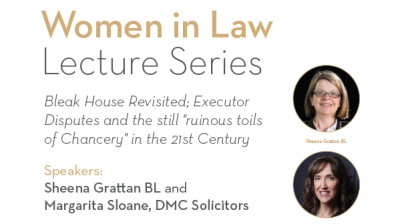High Court: Court delineates notification and procedural requirements for applications under s.27(4) Succession Act 1965

The High Court has reminded lenders that as notification is a fundamental aspect of a fair hearing, they must take “reasonable steps” to identify family members of deceased borrowers and must demonstrate attempts to communicate with those family members or to write to those claiming to represent the deceased at his last place of residence.

About this case:
- Citation:[2024] IEHC 87
- Judgment:
- Court:High Court
- Judge:Ms Justice Siobhán Stack
Delivering judgment for the High Court, Ms Justice Siobhan Stack stated that she was “setting out what I believe to be the appropriate practice and procedure before bringing an application of this type in the Probate List, both in terms of the requirement to notify those with a prior entitlement to extract a grant, and in terms of what is required by way of proofs in this type of application”.
Background
In 2007, the deceased, jointly with his brother as co-borrowers, took three loans from the plaintiff’s predecessor in title secured by mortgages over three properties.
The deceased died on 5 August 2016, but no representation to his estate was ever extracted. The plaintiff applied pursuant to s.27(4) of the Succession Act 1965 for liberty to appoint an administrator ad litem to extract letters of administration in the deceased’s estate for the purposes, inter alia, of receiving letters of demand and substantiating intended debt recovery proceedings.
The High Court
Ms Justice Siobhan Stack considered that the deceased’s death more than two years prior raised the issue of whether s.9(2) of the Civil Liability Act 1961 would render the intended proceedings not maintainable, noting that this issue was to be considered as part of whether there were “special circumstances” making it “necessary” or “expedient” as per s.27(4) to permit someone other than the person ordinarily entitled to extract letters of representation in the deceased’s estate.
The court opined that notification is a “fundamental aspect” of any fair hearing, but institutional lenders such as the plaintiff could have difficulties identifying when a borrower has died, whether testate or intestate, and who might be entitled to extract representation in their estate.
Finding that it would be inappropriate to grant an order pursuant to s.27(4) without requiring the lender to take reasonable steps to identify the family members entitled to take out a grant, “or at the very least” to write to those entitled to represent the deceased at his last place of residence, the judge pointed out that the plaintiff’s grounding affidavit merely asserted that no one had come forward to extract a grant in the six years since the date of death and the date of swearing of the affidavit, and so she made directions to notify the deceased’s family of the intended application now before her.
In circumstances where the plaintiff had sent a registered letter to the deceased’s last place of residence which was signed for, and where the deceased’s daughter had appeared in court on one occasion, Ms Justice Stack was satisfied that the deceased’s family were aware of the application and in the absence of any indication that a grant would be extracted, “special circumstances” arose as it would be unjust to prevent the plaintiff from bringing proceedings to enforce its security.
Turning to consider whether those “special circumstances” would make it “necessary” or “expedient” that an order would be made, the court noted that “an immediate issue springs to mind as the application is made outside the two year limitation period in s. 9 (2) of the 1961 Act”.
Noting that s.9 is a matter to be pleaded as a defence rather than an absolute bar to proceedings, as per Cawley v. Dún Laoghaire Rathdown County Council [2021] IECA 266, Ms Justice Stack highlighted that administrators are not obliged to actively defend proceedings and that “the role and function of such an administrator is very limited”.
As such, the judge stated that it is “material to the exercise of the discretion under s. 27 (4) that a lender who has delayed in bringing the necessary proceedings might potentially obtain a windfall by procuring the appointment of their nominee as personal representative, as that person will have no material outcome in the proceedings, is not obliged to take steps to actively defend the proceedings, and in any event may not have access to all of the relevant information to plead a defence which may be available”.
Referring to the case before her, Ms Justice Stack outlined that in circumstances where the plaintiff had acquired the loans and related security in 2018, and there appeared to have been a default prior to this (but after the deceased’s death), it “is therefore entirely possible that a formal demand in respect of that loan was made prior to the acquisition of the loans. If so, then that fact would only be known to the family members who might have access to the documentation relating to the loan”.
Noting the situation before her as being analogous to Cawley, the judge stated that “I will therefore apply the test approved by the Court of Appeal in Cawley in exercising my discretion under pursuant to section 27 (4) and will consider whether the intended proceedings are ‘hopelessly statute-barred’.”
The court considered that “the critical issue when considering whether the relevant limitation period is that in s. 9 (2) of the Civil Liability Act, 1961, or the longer limitation periods provided for in the Statute of Limitations, is to identify when the cause of action accrues. If it accrues before death, then the claim is one which was ‘subsisting’ (within the meaning of s. 8) prior to death and is therefore deemed to ‘survive’. The limitation period in s. 9 applies to all actions which ‘survive’. However, causes of action which do not accrue prior to death cannot be said to ‘survive’ death: they simply arise later and do not depend on s. 8 to be maintainable.”
The judge continued, noting that if a cause of action accrues after death, “then the usual limitation period in the Statute of Limitations, 1957 applies, and this will be either six or twelve years from death depending on whether the relevant obligation is contained in a deed”.
The court then proceeded to consider when the right to sue on foot of the loan agreements accrued in the case before her, remarking that such requires interpretation of the loan documentation together with the standard terms and conditions incorporated by reference into the facility letter, as per Irish Life and Permanent plc v. Dunne [2016] 1 I.R. 92.
Ms Justice Stack considered that in circumstances where the three loans taken by the deceased jointly with his brother were for a term of ten years, and where the earliest date upon which the principal sums became payable fell after the deceased’s death, “it cannot be said that the intended proceedings are clearly statute barred by reason of section 9 (2)”.
Conclusion
Accordingly, the court found that there were special circumstances making it necessary or expedient to allow someone other than the persons next entitled to extract a grant in the deceased’s estate, and made an order pursuant to s.27(4).
Re Joseph Kelly, Deceased [2024] IEHC 87










